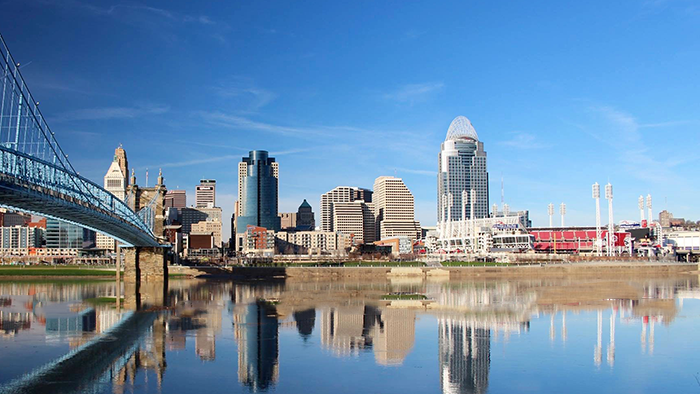Celebrating National Water Quality Month
How Proper Recycling Protects Northern Kentucky's Rivers and Streams

The Ohio River and Cincinnati Skyline
As we step into August 2025, it's time to celebrate National Water Quality Month, a dedicated period to highlight the vital importance of safeguarding our planet's most precious resource: clean water. In Northern Kentucky, where the majestic Ohio River converges with the Licking River and numerous smaller streams weave through our communities, this observance takes on special significance. These waterways not only provide drinking water, support wildlife, and offer recreational opportunities but also face ongoing threats from pollution. One powerful way residents can contribute to their protection is through proper recycling—a simple yet impactful practice that reduces waste, conserves resources, and prevents contaminants from entering our rivers and streams.
Understanding National Water Quality Month
Established in 2005 by the United Nations and the Environmental Protection Agency (EPA), National Water Quality Month encourages individuals, communities, and organizations to reflect on their role in maintaining clean water sources. Throughout August, events, cleanups, and educational campaigns emphasize actions like reducing pollution, conserving water, and participating in local initiatives. For Northern Kentucky, this month serves as a reminder of our interconnectedness with the environment—our daily habits directly influence the health of the Ohio River, which supplies water to millions, and the Licking River, a key tributary facing challenges from urban and agricultural runoff.
The Crucial Link Between Recycling and Water Quality
Recycling isn't just about saving space in landfills; it's a frontline defense against water pollution. When we recycle materials like paper, plastics, metals, and glass, we reduce the demand for raw resource extraction, which often involves water-intensive processes that can contaminate nearby streams. For instance, manufacturing products from recycled materials uses significantly less water and energy compared to virgin resources—recycling paper alone can cut water pollution by 35% and air pollution by 73%. Improperly disposed waste, such as plastics and chemicals, can leach harmful substances into groundwater or wash into rivers during storms, leading to issues like algal blooms and toxic buildup.
In essence, proper recycling minimizes nonpoint source pollution—the diffuse runoff that carries contaminants from landfills, roads, and industrial sites into waterways. By diverting waste from landfills, we prevent leachate (polluted liquid) from seeping into aquifers and streams, preserving habitats for fish, birds, and other wildlife. This not only improves water quality but also supports a circular economy, where resources are reused, reducing overall environmental strain.
Water Quality Challenges in Northern Kentucky
Northern Kentucky's rivers and streams are treasures, but they're under pressure. A recent report indicates that 67% of Kentucky's waterways are classified as "impaired," meaning they don't meet standards for safe use due to pollutants like bacteria, silt, and nutrients from sewage, agriculture, and urban runoff. The Licking River region, in particular, suffers from high levels of organic enrichment, low dissolved oxygen, and contaminants from nonpoint sources, exacerbating issues during heavy rains. The Ohio River faces similar threats, including industrial waste and stormwater overflow, which can introduce heavy metals and plastics that harm aquatic life and human health.
These challenges are amplified by climate change, with more frequent storms flushing pollutants into local waters. However, community-driven efforts, including enhanced recycling, are making strides in mitigating these risks and restoring ecosystem balance.
Local Recycling Programs Making a Difference
Fortunately, Northern Kentucky boasts robust recycling infrastructure to combat these issues. Boone County operates a 24/7 Recycling Center at 3275 Maplewood Drive in Burlington, accepting items like paper, cardboard, plastics, and metals via convenient big blue bins. Kenton County provides multiple drop-off locations managed by Public Works, while Campbell County offers six sites for household recyclables, all free of charge.
The Northern Kentucky Solid Waste Management Authority (NKSWMA) coordinates regional efforts, including educational programs on waste reduction and composting, which indirectly protect water by keeping organic waste out of landfills. In Covington, Rumpke Waste & Recycling handles curbside collection, making it easy for residents to participate. Organizations like Sanitation District No. 1 (SD1) integrate recycling with stormwater management to prevent runoff pollution, hosting events and cleanups that align perfectly with National Water Quality Month activities.
These programs not only divert thousands of tons of waste annually but also educate the public on how recycling directly safeguards our rivers—by reducing the volume of trash that could end up as litter in streams.
Practical Tips for Proper Recycling in Northern Kentucky
Getting started is straightforward. Here are some actionable tips tailored to our region:
- Sort Correctly: Rinse containers to avoid contamination. Accepted items typically include plastics #1-7, aluminum cans, glass bottles, and cardboard. Check local guidelines, as they vary by county.
- Avoid Wishcycling: Don't recycle items like plastic bags or electronics in curbside bins—these require special handling at facilities like the Cincinnati Recycling and Reuse Hub, partnered with Northern Kentucky University.
- Participate in Events: Join Boone County's litter cleanups or recycling drives, often held in August to tie into National Water Quality Month.
- Reduce and Reuse First: Before recycling, consider ways to minimize waste, like using reusable bags and bottles, which cuts down on potential pollutants entering waterways.
- Compost Organics: Many local programs support backyard composting, preventing nutrient-rich waste from causing algal blooms in rivers.
By following these steps, you contribute to cleaner streams and a healthier Ohio River basin.
A Call to Action for a Cleaner Future
As National Water Quality Month unfolds in August 2025, let's commit to protecting Northern Kentucky's rivers and streams through diligent recycling. Every bottle recycled, every cleanup attended, and every habit changed adds up to substantial improvements in water quality. Visit local resources like nkyrecycling.com or contact your county's solid waste department to get involved. Together, we can ensure that our waterways remain vibrant and safe for generations to come—because clean water isn't just a resource; it's our lifeline.